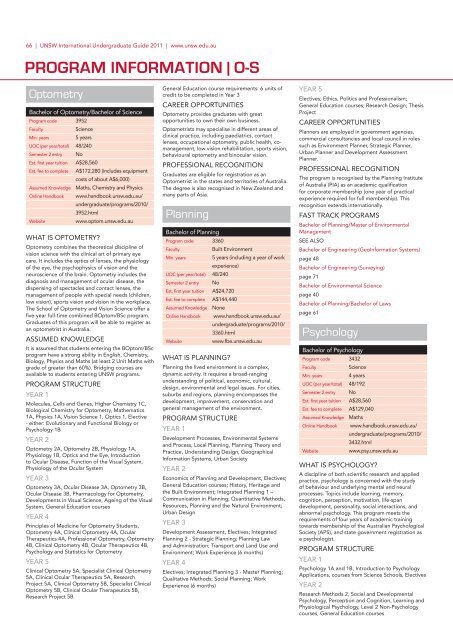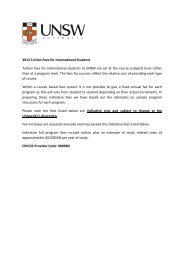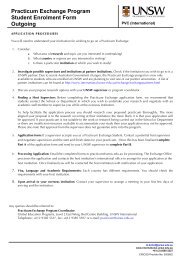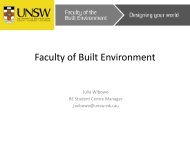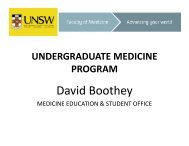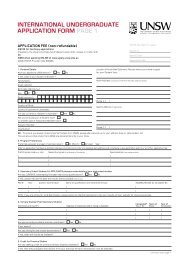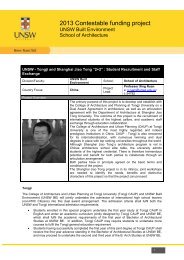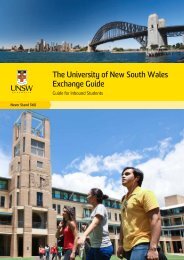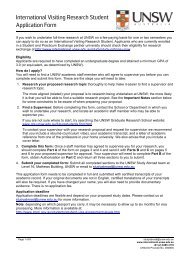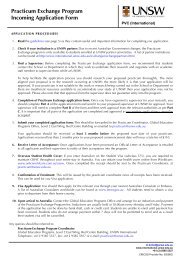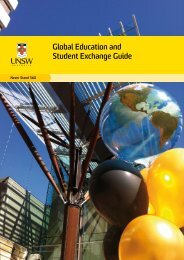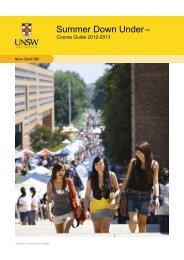66 | <strong>UNSW</strong> <strong>International</strong> Undergraduate Guide 2011 | www.unsw.edu.auprogram information | O-SOptometryBachelor <strong>of</strong> Optometry/Bachelor <strong>of</strong> ScienceProgram code 3952FacultyMin. yearsScience5 yearsUOC (per year/total) 48/240Semester 2 entryEst. first year tuitionEst. fee to completeNoA$28,560A$172,280 (includes equipmentcosts <strong>of</strong> about A$6,000)Assumed Knowledge Maths, Chemistry and PhysicsOnline HandbookWebsitewww.handbook.unsw.edu.au/<strong>undergraduate</strong>/programs/2010/3952.htmlWhat is Optometry?www.optom.unsw.edu.auOptometry combines the theoretical discipline <strong>of</strong>vision science with the clinical art <strong>of</strong> primary eyecare. It includes the optics <strong>of</strong> lenses, the physiology<strong>of</strong> the eye, the psychophysics <strong>of</strong> vision and theneuroscience <strong>of</strong> the brain. Optometry includes thediagnosis and management <strong>of</strong> ocular disease, thedispensing <strong>of</strong> spectacles and contact lenses, themanagement <strong>of</strong> people with special needs (children,low vision), sports vision and vision in the workplace.<strong>The</strong> School <strong>of</strong> Optometry and Vision Science <strong>of</strong>fer afive-year full-time combined BOptom/BSc program.Graduates <strong>of</strong> this program will be able to register asan optometrist in Australia.Assumed KnowledgeIt is assumed that students entering the BOptom/BScprogram have a strong ability in English, Chemistry,Biology, Physics and Maths (at least 2 Unit Maths withgrade <strong>of</strong> greater than 60%). Bridging courses areavailable to students entering <strong>UNSW</strong> programs.Program Structureyear 1Molecules, Cells and Genes, Higher Chemistry 1C,Biological Chemistry for Optometry, Mathematics1A, Physics 1A, Vision Science 1, Optics 1, Elective- either: Evolutionary and Functional Biology orPsychology 1Byear 2Optometry 2A, Optometry 2B, Physiology 1A,Physiology 1B, Optics and the Eye, Introductionto Ocular Disease, Function <strong>of</strong> the Visual System,Physiology <strong>of</strong> the Ocular Systemyear 3Optometry 3A, Ocular Disease 3A, Optometry 3B,Ocular Disease 3B, Pharmacology for Optometry,Developments in Visual Science, Ageing <strong>of</strong> the VisualSystem, General Education coursesyear 4Principles <strong>of</strong> Medicine for Optometry Students,Optometry 4A, Clinical Optometry 4A, Ocular<strong>The</strong>rapeutics 4A, Pr<strong>of</strong>essional Optometry, Optometry4B, Clinical Optometry 4B, Ocular <strong>The</strong>rapeutics 4B,Psychology and Statistics for Optometryyear 5Clinical Optometry 5A, Specialist Clinical Optometry5A, Clinical Ocular <strong>The</strong>rapeutics 5A, ResearchProject 5A, Clinical Optometry 5B, Specialist ClinicalOptometry 5B, Clinical Ocular <strong>The</strong>rapeutics 5B,Research Project 5BGeneral Education course requirements: 6 units <strong>of</strong>credit to be completed in Year 3Career OpportunitiesOptometry provides graduates with greatopportunities to own their own business.Optometrists may specialise in different areas <strong>of</strong>clinical practice, including paediatrics, contactlenses, occupational optometry, public health, comanagement,low vision rehabilitation, sports vision,behavioural optometry and binocular vision.Pr<strong>of</strong>essional RecognitionGraduates are eligible for registration as anOptometrist in the states and territories <strong>of</strong> Australia.<strong>The</strong> degree is also recognised in <strong>New</strong> Zealand andmany parts <strong>of</strong> Asia.PlanningBachelor <strong>of</strong> PlanningProgram code 3360FacultyBuilt EnvironmentMin. years 5 years (including a year <strong>of</strong> workexperience)UOC (per year/total) 48/240Semester 2 entry NoEst. first year tuition A$24,720Est. fee to complete A$144,440Assumed Knowledge NoneOnline Handbook www.handbook.unsw.edu.au/<strong>undergraduate</strong>/programs/2010/3360.htmlWebsitewww.fbe.unsw.edu.auWhat is Planning?Planning the lived environment is a complex,dynamic activity. It requires a broad-rangingunderstanding <strong>of</strong> political, economic, cultural,design, environmental and legal issues. For cities,suburbs and regions, planning encompasses thedevelopment, improvement, conservation andgeneral management <strong>of</strong> the environment.Program StructureYear 1Development Processes, Environmental Systemsand Process, Local Planning, Planning <strong>The</strong>ory andPractice, Understanding Design, GeographicalInformation Systems, Urban SocietyYear 2Economics <strong>of</strong> Planning and Development, Electives;General Education courses; History, Heritage andthe Built Environment; Integrated Planning 1 –Communication in Planning; Quantitative Methods,Resources, Planning and the Natural Environment;Urban DesignYear 3Development Assessment, Electives; IntegratedPlanning 2 - Strategic Planning; Planning Lawand Administration; Transport and Land Use andEnvironment; Work Experience (6 months)Year 4Electives; Integrated Planning 3 - Master Planning;Qualitative Methods; Social Planning; WorkExperience (6 months)Year 5Electives; Ethics, Politics and Pr<strong>of</strong>essionalism;General Education courses; Research Design; <strong>The</strong>sisProjectCareer OpportunitiesPlanners are employed in government agencies,commercial consultancies and local council in rolessuch as Environment Planner, Strategic Planner,Urban Planner and Development AssessmentPlanner.Pr<strong>of</strong>essional Recognition<strong>The</strong> program is recognised by the Planning Institute<strong>of</strong> Australia (PIA) as an academic qualificationfor corporate membership (one year <strong>of</strong> practicalexperience required for full membership). Thisrecognition extends internationally.Fast Track ProgramsBachelor <strong>of</strong> Planning/Master <strong>of</strong> EnvironmentalManagementSEE ALSOBachelor <strong>of</strong> Engineering (GeoInformation Systems)page 48Bachelor <strong>of</strong> Engineering (Surveying)page 71Bachelor <strong>of</strong> Environmental Sciencepage 40Bachelor <strong>of</strong> Planning/Bachelor <strong>of</strong> Lawspage 61PsychologyBachelor <strong>of</strong> PsychologyProgram code 3432FacultyScienceMin. years 4 yearsUOC (per year/total) 48/192Semester 2 entry NoEst. first year tuition A$28,560Est. fee to complete A$129,040Assumed Knowledge MathsOnline Handbook www.handbook.unsw.edu.au/<strong>undergraduate</strong>/programs/2010/3432.htmlWebsitewww.psy.unsw.edu.auWhat is Psychology?A discipline <strong>of</strong> both scientific research and appliedpractice, psychology is concerned with the study<strong>of</strong> behaviour and underlying mental and neuralprocesses. Topics include learning, memory,cognition, perception, motivation, life-spandevelopment, personality, social interactions, andabnormal psychology. This program meets therequirements <strong>of</strong> four years <strong>of</strong> academic trainingtowards membership <strong>of</strong> the Australian PsychologicalSociety (APS), and state government registration asa psychologist.Program StructureYear 1Psychology 1A and 1B, Introduction to PsychologyApplications, courses from Science Schools, ElectivesYear 2Research Methods 2, Social and DevelopmentalPsychology, Perception and Cognition, Learning andPhysiological Psychology, Level 2 Non-Psychologycourses, General Education courses
www.unsw.edu.au | <strong>UNSW</strong> <strong>International</strong> Undergraduate Guide 2011 | 67Year 3Research Methods 3A and 3B, Assessment andPersonality, Level 3 Psychology courses, Electives(sample list): Vision and Brain, <strong>The</strong> Psychology<strong>of</strong> Language, Cognitive Science, PhysiologicalPsychology, Psychobiology <strong>of</strong> Memory andMotivation, Social Psychology, Personality andIndividual Differences, General Education coursesYear 4Psychology 4A and 4BCareer OpportunitiesA pr<strong>of</strong>essional qualification in psychology leads tocareers in clinical, organisational and forensic settingsas well as teaching and research. <strong>The</strong> main employer<strong>of</strong> trained psychologists is the government sectorwhere psychologists work in areas ranging fromhealth, education and community services throughto police, corrective services, industrial relations,and road and traffic authorities. Other employersare tertiary institutions, management and personnelconsultants, market research organisations andbanks. Many psychologists also work in privateemployment as clinical, educational or industrialconsultants.Pr<strong>of</strong>essional RecognitionTo become a member <strong>of</strong> the Australian PsychologicalSociety, and for registration as a psychologist in <strong>New</strong><strong>South</strong> Wales, Australia, students must first completean approved four-year degree in psychology followedby an approved fifth and sixth year academic degreesuch as one <strong>of</strong> the Master <strong>of</strong> Psychology degrees(Clinical, Forensic, Organisational) <strong>of</strong>fered at <strong>UNSW</strong>.An alternative <strong>of</strong> two years <strong>of</strong> supervised experiencein pr<strong>of</strong>essional practice can be undertaken to satisfygovernment registration requirements.SEE ALSOBachelor <strong>of</strong> Artsmajor in Psychologypage 35Note: Those students who wish to complete theBachelor <strong>of</strong> Psychology must transfer from theBachelor <strong>of</strong> Arts to complete the final two years.Check with the Faculty for more details.Bachelor <strong>of</strong> Sciencemajor in Psychologypage 68Bachelor <strong>of</strong> Science (Advanced)page 68Sciences andAdvanced ScienceBachelor <strong>of</strong> ScienceProgram code 3970FacultyMin. yearsScience3 yearsUOC (per year/total) 48/144Semester 2 entryEst. first year tuitionEst. fee to completeYes (may require summer sessionafter 1st semester)A$28,560A$93,960Assumed Knowledge Maths and Chemistry plus BiologyOnline HandbookWebsiteor Earth and Environmental Scienceor Physicswww.handbook.unsw.edu.au/<strong>undergraduate</strong>/programs/2010/3970.htmlwww.science.unsw.edu.auWhat is the Bachelor <strong>of</strong> Science?This is one <strong>of</strong> the most flexible degree programsat <strong>UNSW</strong>, <strong>of</strong>fering a wide range <strong>of</strong> study options.It is based on a solid foundation <strong>of</strong> core areas inscience such as Biology, Chemistry, Physics, Maths,Geography, Geology and Psychology. In additionto these areas students can choose from morethan 30 fields. <strong>The</strong> Bachelor <strong>of</strong> Science program isstructured so that students have the opportunity toapply to transfer between this program and other<strong>UNSW</strong> Science programs, including pr<strong>of</strong>essional andadvanced level degrees.Students with excellent grades will be invited tocomplete an honours fourth year.Major Discipline Areas Include:Anatomy <strong>The</strong> study <strong>of</strong> the structure <strong>of</strong> the humanbody. By understanding the structure <strong>of</strong> the humanbody we are better able to appreciate how itfunctions and why it can malfunction.Biochemistry is the study <strong>of</strong> molecules and chemicalreactions that occur in all living organisms, eg. whatturns food into energy? How does DNA determineour appearance and how do plants trap and use theenergy <strong>of</strong> sunlight?Biological Science (Animal Behaviour, Cell Biologyand Environmental Science, Evolution and Genetics,Invertebrate Zoology, Australian Mammals, MarineBiology, Plant Physiology, Systematics and Taxonomy)Biology is the study <strong>of</strong> life and living organisms. Itbrings together and makes use <strong>of</strong> many areas <strong>of</strong>science and encompasses all aspects <strong>of</strong> plant andanimal biology including how they interrelate witheach other and interact in and with the environment.Biotechnology involves harnessing microbial, plantand animal cells and their components for the benefit<strong>of</strong> people. <strong>The</strong> essential feature <strong>of</strong> biotechnology isthe use <strong>of</strong> biological processes based on living cellsand biochemical molecules such as proteins, DNAand RNA.Chemistry deals with the design, synthesis, analysisand properties <strong>of</strong> molecules. <strong>The</strong> study <strong>of</strong> chemistrywill appeal to those with an enquiring, analyticalmind and good powers <strong>of</strong> observation anddeduction.Environmental Earth Science studies the history <strong>of</strong>change on Earth. <strong>The</strong> origins <strong>of</strong> continents, oceans,atmosphere and the planet itself are considered fromvarious perspectives. It examines the beginnings <strong>of</strong>life; the evolution <strong>of</strong> fauna and flora from geneticand fossil evidence; the relationships between Earth’sgeological environments and their associated lifeforms, and the effects <strong>of</strong> change, both natural andman made on soil, water and landscape.Ecology is the science <strong>of</strong> the relationships betweenorganisms and their environments. To conserve ournatural environment we need to understand howanimals and plants interact with one another as wellas their environment, both on land and in the sea.Environment and Society* examines the interfacebetween environmental science and environmentalstudies allowing students a deeper understanding<strong>of</strong> environmental issues and better preparation forscience graduates in areas such as environmentalpolicy.Food Science involves the understanding <strong>of</strong> basicsciences and the application <strong>of</strong> this knowledgeto foods from the point <strong>of</strong> production up toconsumption by consumers. It concerns foodprocesses, commodities, composition and quality(including sensory properties, safety and nutritionalvalue).Genetics is the study <strong>of</strong> the basis <strong>of</strong> inheritance,<strong>of</strong> DNA and genes. It investigates the way inwhich biological information is passed on fromone generation to the next, as well as how thatinformation is used and stored. Molecular geneticistsstudy the way in which DNA forms genes and thegenes make proteins, and how DNA forms the basis<strong>of</strong> the way all living things look and function.Geography is the study <strong>of</strong> spatial and temporalvariations <strong>of</strong> the phenomena that make up naturaland human-dominated environments.Geology is the science <strong>of</strong> the earth, its constitutionand evolution in a broad sense. It includes surveyingmetallic ore deposits, fossil fuels and groundwaterresources, and applying geological knowledge in arange <strong>of</strong> engineering and environmental contexts.History and Philosophy <strong>of</strong> Science* is aninterdisciplinary field that examines the past, presentand future <strong>of</strong> science, technology, society andmedicine from various ‘meta’ perspectives. As wellas the history, philosophy and sociology <strong>of</strong> sciencetechnology and medicine, the field incorporatesscience and technology policy and important aspects<strong>of</strong> environmental studies.Marine Science (Marine Biology, Marine Geology,Physical Oceanography) looks at all aspects <strong>of</strong> themarine environment from ocean currents to dolphincommunication. It encompasses many sciencesfrom geology and physics to engineering and foodtechnology. Marine Science can be studied with anemphasis on biology, earth sciences, environmentalchemistry, oceanography or physical oceanography.Materials Science is the underlying science <strong>of</strong> highperformance materials (metals, ceramics, plastics,composites, electronic materials and biomaterials),making things from them and predicting theirperformance. Also see page 49Mathematics is at the basis <strong>of</strong> very exciting anddiverse areas <strong>of</strong> activity in technological andcommercial fields such as computational weatherprediction, statistics, investment in financial markets,chaos, optimisation and cryptography.Medical Microbiology and Immunology focuses onthe processes <strong>of</strong> health and disease in relation tointeractions between microscopic organisms (viruses,bacteria, fungi and protozoa), and the immunedefence system that is present within our bodies. Itis intertwined with the disciplines <strong>of</strong> Biochemistry,Molecular Biology and Genetics.Microbiology is the study <strong>of</strong> the smallest forms <strong>of</strong>life: bacteria, viruses, archaea, fungi and protozoa.Fundamental principles <strong>of</strong> Chemistry and Biologyprovide a foundation.Molecular Biology is one <strong>of</strong> the most exciting areas<strong>of</strong> modern Biochemistry. This area <strong>of</strong> Biochemistryhas contributed much to our understanding <strong>of</strong> howgenes function by using the techniques <strong>of</strong> geneticengineering and DNA technology.Neuroscience has two primary goals: one isto understand and explain behaviour andconsciousness; the other is to understand and treatdiseases <strong>of</strong> the nervous system such as Schizophreniaand Alzheimer’s Disease.Pharmacology is the study <strong>of</strong> drugs and their effectson living tissue and whole organisms. It examineshow drugs are discovered; how they are absorbedand eliminated; the mechanics <strong>of</strong> action andside effects; how drugs help maintain health andcounteract illness and disease.Philosophy* studies reasoning, concepts and forms<strong>of</strong> argument across a wide range <strong>of</strong> subject areas. Itencourages critical and imaginative thinking aboutthe theoretical foundations and conceptual aspects<strong>of</strong> science.NOTEEstimated first year tuition is based on 2010 tuition fees.Total program costs are an indicative figure only. Indicativefees have been calculated on a percentage increase forevery year <strong>of</strong> the program. Fee increases are assessedannually and may exceed the indicative figures listedabove.Estimated fees to complete include tuition plus anestimate <strong>of</strong> other study-related costs <strong>of</strong> approx A$1,000per year.


